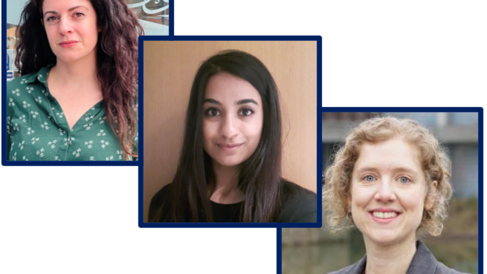
Dozens of people from the University of Cambridge and beyond joined the Cambridge Interfaith Programme for a series of events to mark Inter Faith Week (13-20 November 2022).
From lunchtime till night
On Monday 14th November, a lunchtime social hour with the Interfaith Research Forum helped forge connections with new scholars in the Faculty of Divinity, the Centre for the Future of Intelligence, and CRASSH. That afternoon, the CIP Management Committee agreed to recommend six people for Forum affiliation, taking note of another half-dozen new members from within the Faculty of Divinity and a similar quantity of Friends and Alumni.
On Monday evening, the student-led Divinity Society sparked a lively discussion between researchers and students on the intersection of religion, culture and belief. It was apparent that studying religion provides an opportunity to explore personal and societal dimensions of identity. As formal discussion closed, questions lingered: are parameters and declarations of belief now bounded as much by issues (abortion, gender, climate change) as traditional identity markers (faith, community)? What is the place of an atheist in interfaith discussion and research?
Dimensions of religious literacy
On Wednesday 16th, we partnered with Leo Baeck College to run a webinar comparing two recent case studies exploring the role of Hebrew learning in Jewish schools. How does the role of language learning as a component of religiosity differ according to context? How is this similar or different to what occurs in other places and other faiths?
CIP researcher Dr Anastasia Badder summarised findings from her fieldwork in Luxembourg, highlighting the observational-analytical approach of her anthropological study. Dr Jo-Ann Myers (Leo Baeck) drew on action research conducted for her doctorate to illustrate how she challenged a typical division between Jewish Studies and Modern Hebrew lessons to improve engagement and comprehension among 7- and 8-year-olds. Linguistic anthropologist Dr Leslie C. Moore (Ohio State) drew upon her own studies of Muslim communities from Cameroon and Somalia to raise questions about curriculum organisation (oral v written, what counts as success) and the spiritual dimension of religious language learning.
While our second planned respondent was not able to attend, this event benefited from generous audience participation, contributing testimony about Muslim Arabic literacies in Australia, South Africa and the UK. The speakers are continuing to collaborate and we hope to host a further event exploring the topic of religious literacies in more depth in 2023. The speakers and participants gave permission for a recording, shared below.
A Wednesday workshop
Later on Wednesday afternoon, a dozen people gathered on site at the Faculty of Divinity for a Scriptural Reasoning workshop. They explored dimensions of righteousness informed by passages from the Hebrew prophets (Micah 6:6-8), the New Testament (Matthew 5:1-12) and the Qur'an (Surah al-Furqan 63-75). We are grateful to Lindsey Taylor-Guthartz and James O'Neil for their input in selecting and presenting texts for discussion.
On each occasion, attendees were keen to carry on these conversations beyond the boundaries of the event, a sign of how Inter Faith Week can foster new connections and inspire fresh dialogue and debate. We look forward to meeting and speaking again.
Watch the webinar on 'Language learning in/as religious education'
Please allow social and marketing cookies to show embedded content.
Header image: composite of speakers at the Divinity Society panel, 14 November 2022.
